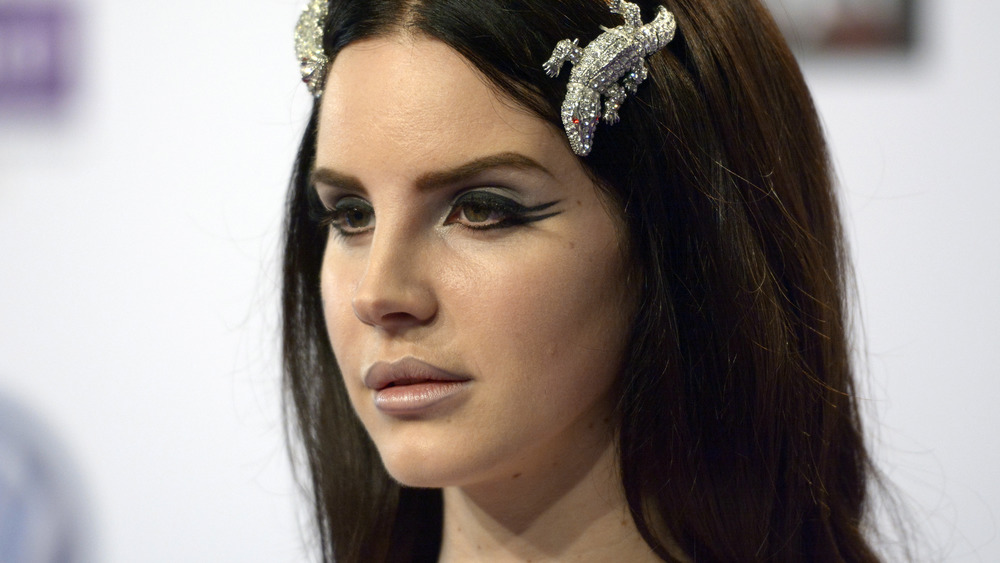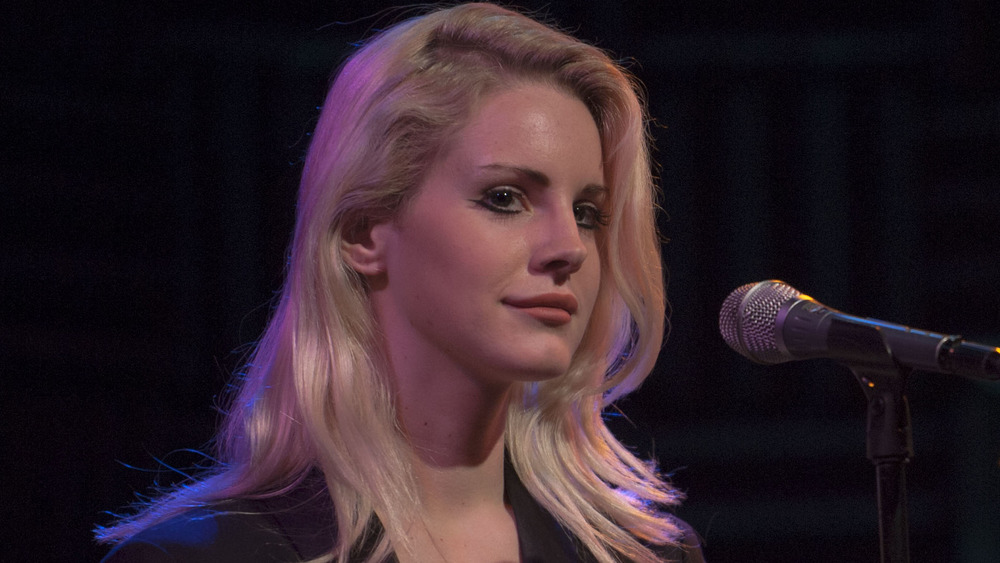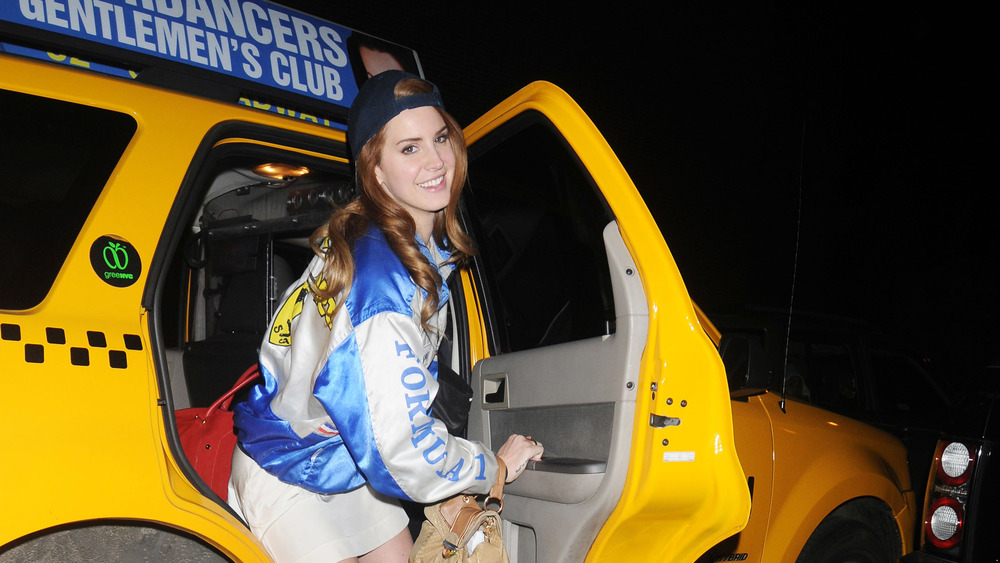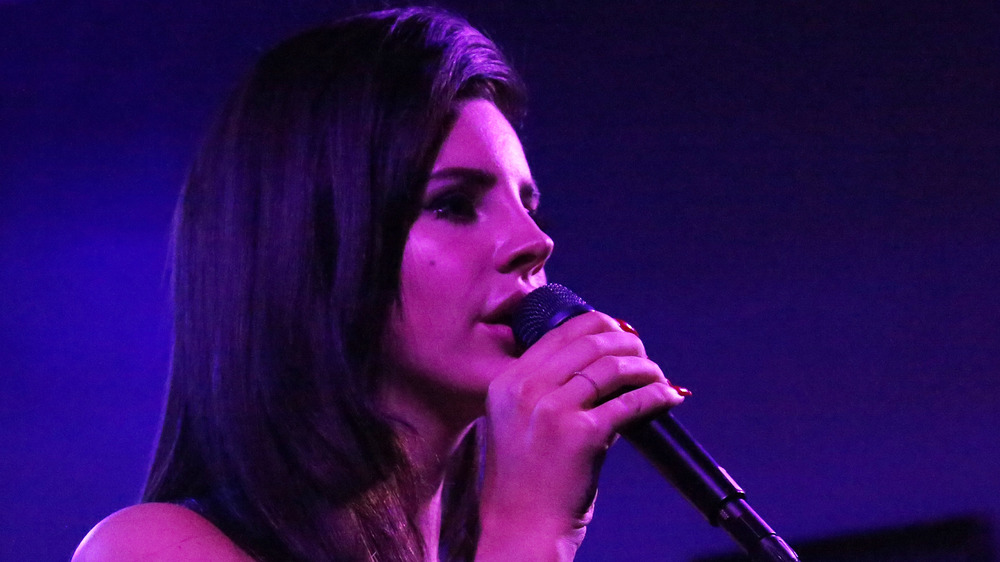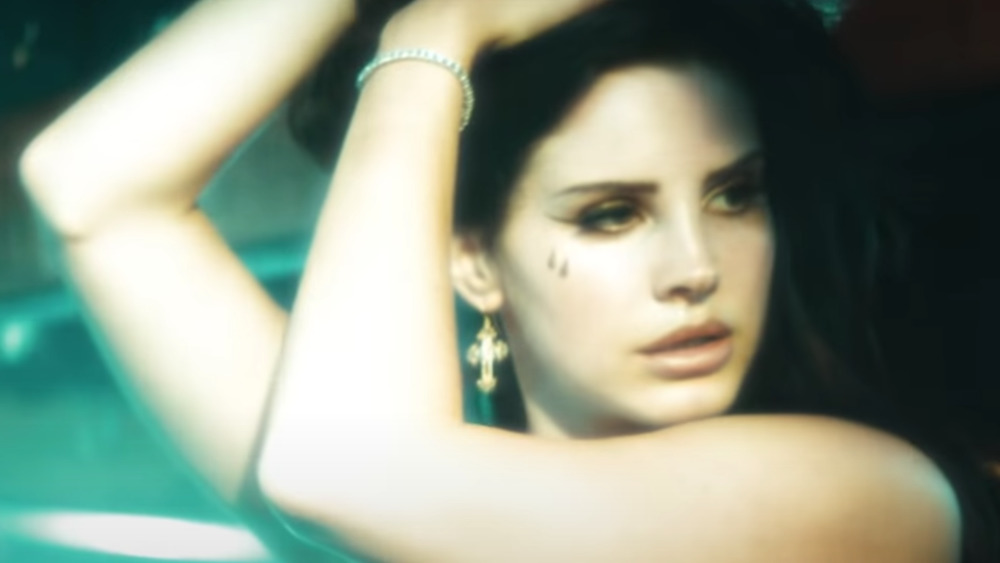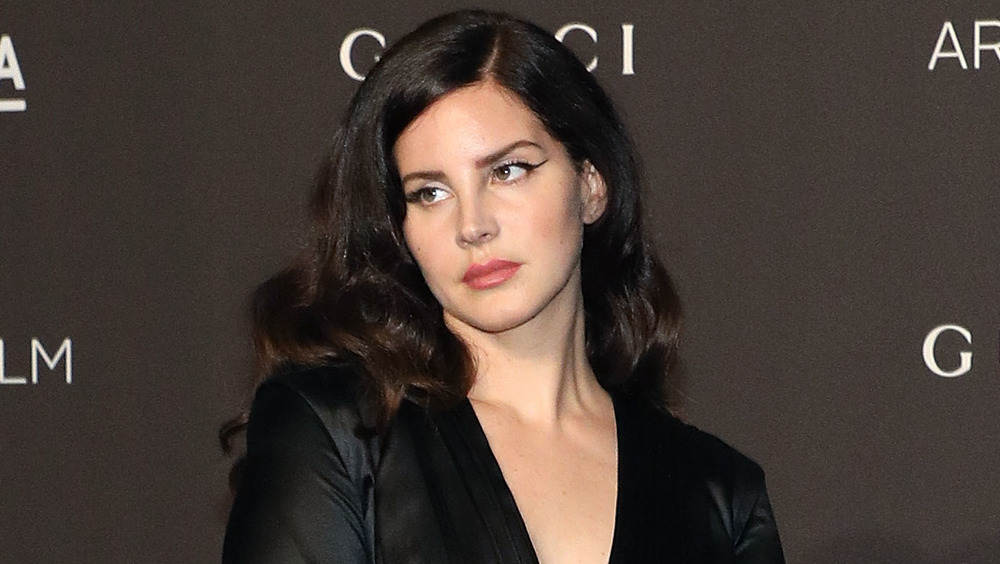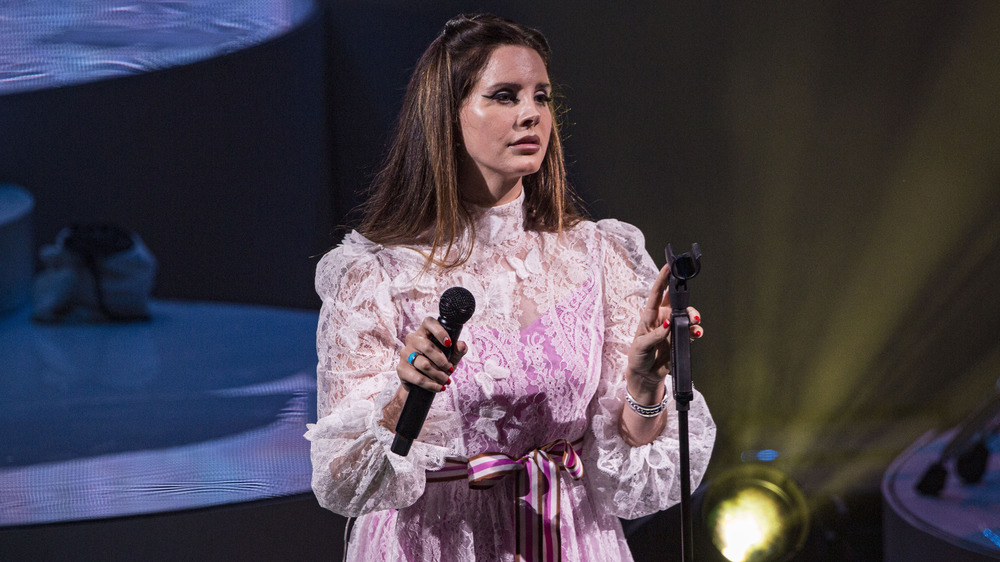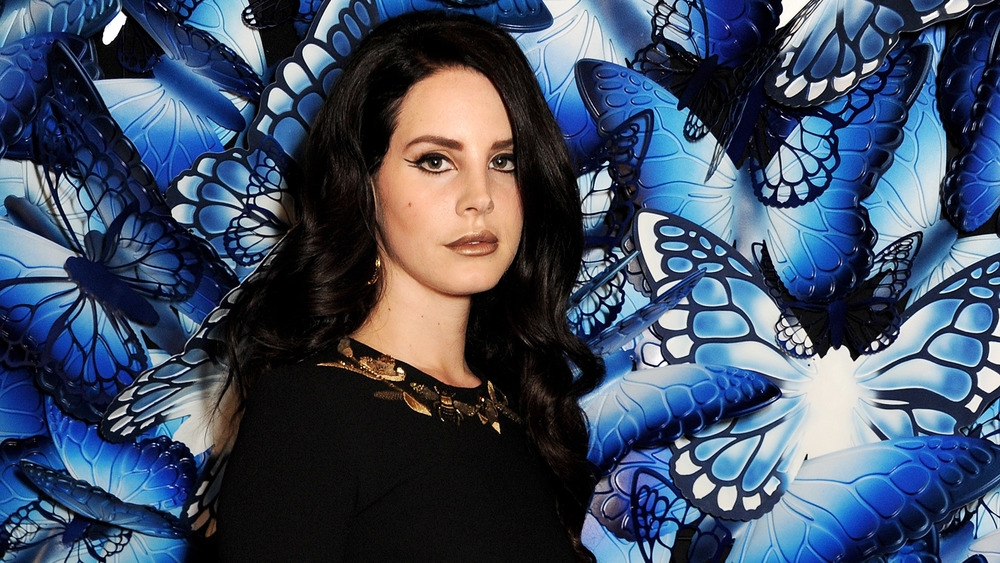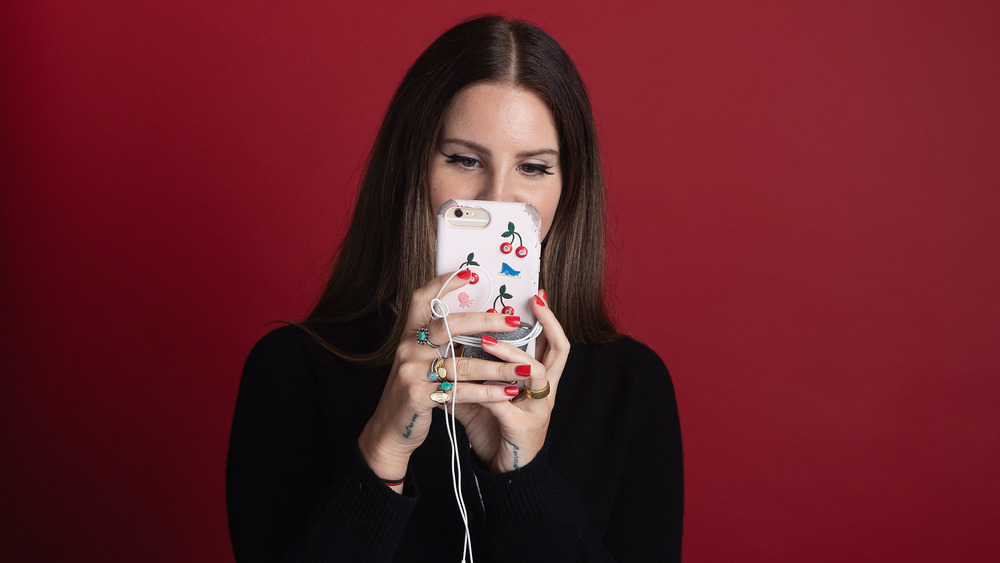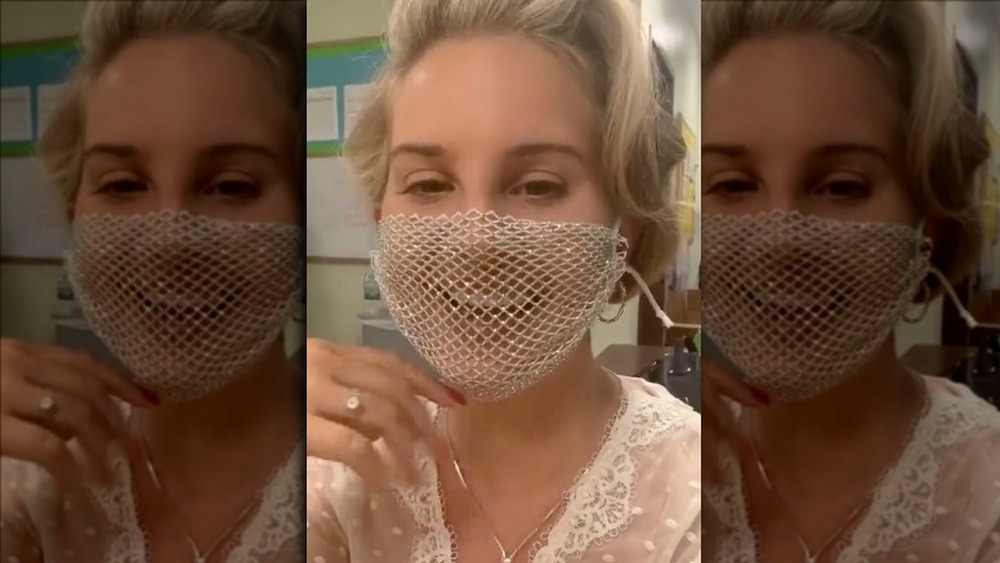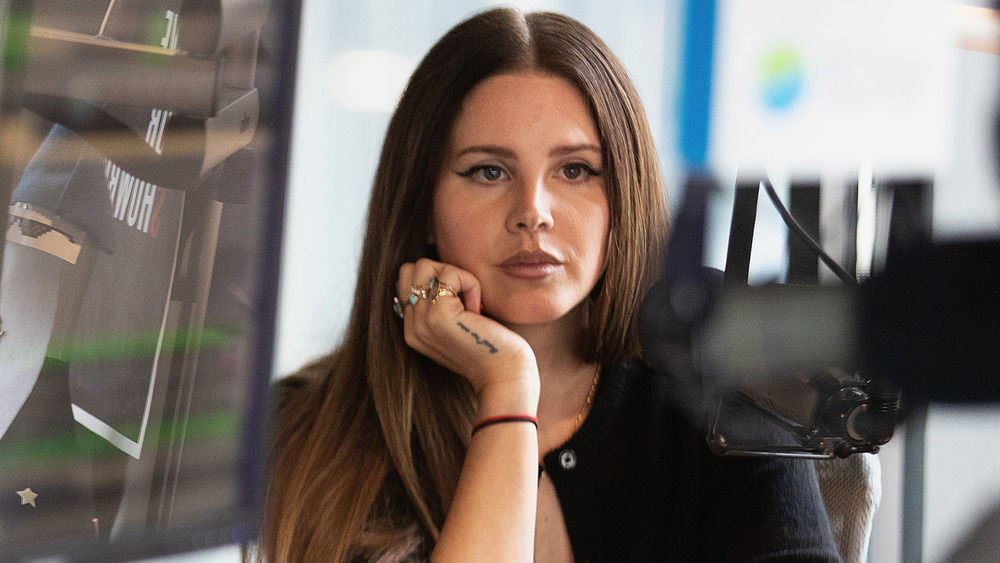The Biggest Controversies Of Lana Del Rey's Career
With lyrics about domestic violence, sleeping her way up to the top, and certain Pepsi-flavored body parts, Lana Del Rey is a professional provocateur. Many of the singer-songwriter's dedicated fans were initially drawn to her based on her lyrical takes on taboo topics like sex, death, and dominance and submission. But throughout the singer's nearly decade-long career, controversy has extended beyond her music and into her public persona — although Del Rey denies she has a "persona" at all.
Through her cinematic albums, artful music videos, and debut poetry collection, Del Rey has become a myth and a legend. The controversy surrounding her began around the time of her lackluster performance on Saturday Night Live in 2012. While the singer was originally shrouded in mystery, Del Rey's increasingly incendiary presence on social media platforms has invited many fans to see beyond the polished, stylized, art-directed facade, and into the psychology of LDR herself. This accessibility has brought fans closer to the initially impenetrable starlet, but her brazen behaviors have also pushed plenty of people away. While Lana Del Rey's career is built on being provocative, the following controversies are among her most memorable.
Don't call Lana Del Rey's fake name a 'persona'
"Like a groupie incognito posing as a real singer," Lana Del Rey sings in her 2012 song "Gods & Monsters," "life imitates art." Though many see the 2012 album Born to Die as her debut LP, Elizabeth "Lizzy" Grant — the singer's real name — released several prior bodies of work, including a 2006 acoustic album called Sirens under the moniker May Jailer and a 2010 album called Lana Del Ray A.K.A. Lizzy Grant. Following the commercial failures of these efforts, Grant dyed her blonde hair brown, got lip injections (reportedly), and rebranded herself as "Lana Del Rey" with an e. Many early fans felt conned by her artificiality.
"I had a vision of making my life a work of art," Del Rey said in a 2012 MySpace interview. At the dawn of her career, the singer was inspired by the mystery and glamour of a pre-social media Hollywood. But in the modern world of celebrity, where accessibility is paramount, fans' deep-dive Google research and social media stalks shattered the illusions Del Rey perpetuated. Media outlets have attempted to explain the disparity between Lizzy Grant and Lana Del Rey — The Atlantic described the "character" as "some fiction combining Jessica Rabbit and Joan Didion" — but Del Rey has claimed this is not the case. "Never had a persona," she tweeted in 2019. "Never needed one. Never will."
Lana Del Rey has idealized a 'white trash' aesthetic
The Lana Del Ray A.K.A. Lizzy Grant LP was laden with themes that have defined the songstress' work ever since, including trailer park love, male dominance, and the American Dream. The mythology of Lana Del Rey follows a narrative of economic desolation and doomed love. In early interviews, the singer styled herself as "a gangster Nancy Sinatra" (per Flaunt) and "Lolita got lost in the hood (via The Guardian)."
In reality, Del Rey's father, domain developer Robert Grant, was initially reported to be a millionaire who funneled cash into his daughter's dreams. Del Rey has since refuted this, but her upbringing was more opulent than her music suggests: she grew up in the picturesque village of Lake Placid, N.Y., and attended the $65k-a-year Kent boarding school in Connecticut.
She went on to live in New Jersey's Manhattan Mobile Home trailer park in her early twenties, but she did so more out of idealism than necessity. "There was a white trash element," she told Electronic Beats in 2013. "I didn't want to be a part of mainstream society because I thought it was gross." Del Rey's habit of glamorizing squalor may not reflect her reality, but it reflects her real rebellion against parts of her past.
Does Lana Del Rey glamorize abuse?
It's difficult to deny that tumultuous relationships with dominant men have been a major through line in Lana Del Rey's music. In 2012, she released the album cover for her second single "Blue Jeans," which featured her lying poolside with a man's tattooed hand closed around her throat. "Advertising your product... by showing a woman getting choked is gross, violent and sexist," Madeleine Davies of Jezebel wrote in response.
Then, in 2014, a video clip surfaced that showed Lana Del Rey in a simulated rape scene. The video was reported to be footage from a scrapped Marilyn Manson music video, but Manson later explained that it was a test project in collaboration with controversial horror filmmaker Eli Roth. "Eli and I wanted to do a music video with her but she was being such a problem," Manson told NME, adding, "I was not willing to make that part of the video."
Both of these instances may have been stylistic choices rather than political statements, but they helped fuel an ongoing discussion of Del Rey's fixation on themes of female submission as anti-feminist. In May 2020, Del Rey posted a lengthy defense of her creative choices to Instagram, taking specific issue with accusations that she "glamorize[s] abuse." In her view, she finds it unfair that her "minor lyrical exploration detailing [her] sometimes submissive or passive roles in [her] relationships has often made people say [she's] set women back hundreds of years."
Lana Del Rey has been accused of cultural appropriation
Native American headdresses and bindis were synonymous with Coachella and Tumblr culture around 2012, but the conversation around cultural appropriation has since grown louder. In her 2012 "Ride" music video, Lana Del Rey, who has Celtic ancestry, wore a headdress while brandishing a gun at a bonfire with a biker gang. Then, following the release of her 2013 short film, Tropico (screenshot above), which accompanied her album Born To Die: Paradise Edition, Del Rey was accused of appropriating "cholo" gangster culture through teardrop face tattoos and tattooed Latino extras. (Though "Del Rey" is Spanish for "of the king," LDR is not Hispanic herself.)
Del Rey discussed accusations of Latinx cultural appropriation in a Maxim interview the following year, saying she lived in East Los Angeles, which has a 96.7 percent Latin American population, and that she had "always spoken Spanish in all [her] songs."
"That's all fine, except that, well, she doesn't live in East Los Angeles or anywhere near it... [and] not all of her songs have Spanish in them," the Maxim scribe noted." (Her Spanish-singing has been limited to the songs "West Coast" and "Ultraviolence" on her Ultraviolence album.)
Death and despair are just Del Rey's brand
"I wish I was dead already," Lana Del Rey said in a 2014 Guardian interview. When the interviewer asked whether she sees early death — a la "The 27 Club" — as glamorous, Del Rey answered, "I don't know. Ummm, yeah." Kurt Cobain's daughter, Frances, responded on Twitter. "I'll never know my father because he died young & it becomes a desirable feat because ppl like u think it's 'cool,'" she wrote in a since-deleted tweet (via ABC News).
With song titles like "Born to Die," "Summertime Sadness," "Sad Girl," and "Pretty When You Cry," sadness and mortality have cast shadows on Del Rey's life and music. "I think ceaselessly of death," she told Madame Figaro (via Dazed). "The concept of mortality is a vagueness that is constantly threatening."
Del Rey's existential despair is not problematic in itself, but her equating it with glamour is. "[Del Rey's statements] can be harmful because they perpetuate norms that discourage seeking help and prioritizing mental health," wrote Miri Mogilevsky of Daily Dot. In a Daily Beast article titled "Lana Del Rey's Silly Death Wish and the Perils of Pop Artifice," Amanda Marcotte highlighted where Del Rey's content problematically intersects with her insistence that she doesn't operate behind a persona: "When audiences clamor for a fantasy of authenticity, it becomes inevitable that people's real addictions, mental health problems — and yes, deaths — get packaged and sold."
Some feminists don't love Lana Del Rey's interpretation
Much of the controversy surrounding Lana Del Rey is tied to the idea that the singer is "good" or "bad" for feminism. In a 2014 Fader interview, Del Rey dismissed the topic. "For me, the issue of feminism is just not an interesting concept," she said, adding, "My idea of a true feminist is a woman who feels free enough to do whatever she wants."
In an interview with Fader a year before the outlet published the Del Rey profile, indie-pop musician Lorde offered her opinion on the singer's impact. "I listened to that Lana Del Rey record and the whole time I was just thinking it's so unhealthy for young girls to be listening to," she said. "This sort of shirt-tugging, desperate, don't leave me stuff."
Still, a counter-argument can be made that Del Rey empowers women in her rejection of the idea that feminists need to project an image of unflinching indestructibility. "Some [feminists] criticize the way she seems to idealize powerlessness and servitude," Duncan Cooper wrote in the 2014 Fader profile, "while others appreciate her fluid embodiment of different identities, as well as her candor about both her desire and her weakness."
Did Lana Del Rey's beef with Azealia Banks go too far?
One of Lana Del Rey's biggest controversies indirectly involved headline grabbers Kanye West and Donald Trump. When West tweeted his support for Trump in 2018, Del Rey, who performed at West's wedding, responded in a lengthy comment (via Elle). "Your support of [Trump] is a loss for our culture. I can only assume you relate to his personality on some level," she wrote, referring to "delusions of grandeur" and "extreme issues with narcissism."
Rapper Azealia Banks then jumped into Del Rey's mentions by writing since-deleted tweets that criticized Del Rey for her silicone-enhanced physical appearance and for voicing her opinion as a "privileged white woman." The rapper also suggested Del Rey had an Oxycodone addiction (via W). Del Rey took the argument a step further by threatening physical violence and taunting Banks' mental health status, tweeting, "Your psych meds aren't working." Since the highly publicized Twitter feud, Del Rey has only gotten increasingly vocal and combative on social media platforms.
Another day, another internet fight for Lana Del Rey
2020 was a particularly controversial year for Lana Del Rey. In May, she posted a lengthy Instagram message about her place in the current wave of feminism and the contemporary music scene. "I'm fed up with female writers and alt singers saying that I glamorize abuse when in reality I'm just a glamorous person singing about the realities of.... emotionally abusive relationships," she wrote. "I'm not not a feminist, but there has to be a place in feminism for women who look and act like me."
She compared her experience to that of artists she thought explored similar themes, including Cardi B, Nicki Minaj, and Beyonce. Because six of the seven artists she listed were women of color, Del Rey was accused of playing the part of a victimized white woman blind to her own racial privilege.
"This is sad to make it about a WOC issue when I'm talking about my favorite singers," Del Rey later wrote on her Instagram Story (via Billboard). "There are certain women that culture doesn't want to have a voice it may not have to do with race I don't know what it has to do with. I don't care anymore but don't ever... call me racist because that is bulls**t."
Lana Del Rey's mesh mask potentially put fans at risk
In October 2020, Lana Del Rey celebrated the release of her debut book of poetry, Violet Bent Backwards Over the Grass, at a Barnes & Noble in Los Angeles. Despite the rampant COVID-19 pandemic, masked fans ventured out to the venue to cautiously celebrate the singer and her book. Del Rey herself was less cautious, sporting a glittering, hole-ridden mesh mask (above). The following week, Billboard consulted with a University of California, San Francisco medical educator, Dr. Peter Chin-Hong, on the mask's effectiveness. "I am not confident that it would prevent any spread of COVID," he said. "The holes are so big in the mesh that you might as well be wearing nothing."
Photos from the event also show a lack of social distancing between Del Rey and attendees. In fact, fans' selfies show them cuddling up cheek-to-cheek with the singer. Granted, we don't know if Del Rey has or has had coronavirus, whether or not she was tested prior to the event, or any other potential safety precautions she may have taken. And while fans were willing to risk potentially contracting the virus in order to meet Del Rey and buy her book, Del Rey's flashy, barely-there mask seemed to suggest that the singer cared more about making a glamorous fashion statement than keeping her fans safe.
No, Lana Del Rey is not MAGA
On Election Day 2020, a fan tweeted that she believed Del Rey was likely to have voted for Donald Trump's re-election. "I just KNOW Elizabeth voted for Trump," the fan wrote, adding, "I wish I could look up her voting records. Something doesn't sit right with me." Instead of ignoring the tweet or simply denying the claim, Del Rey hit reply and wrote, "Go. Fuxk. Yourself." The fan claimed she was merely speculating and that she even had a Lana Del Rey tattoo on her arm, but the singer doubled down on her dismissal. "Nah read what u wrote h*e," Del Rey replied. The Twitter user then threatened to stop being a fan of the singer. "Bro. I've been waiting for u to. Do it," Del Rey replied.
Del Rey has long been outspoken in her opposition of Trump and his policies, from her criticism of Kanye West's pro-Trump message to her attempts to hex the politician. Still, many found the singer's sharp response to the (former) fan's comment unnecessarily harsh, given that the lavish life Del Rey luxuriates in is a direct result of her fans' support.

